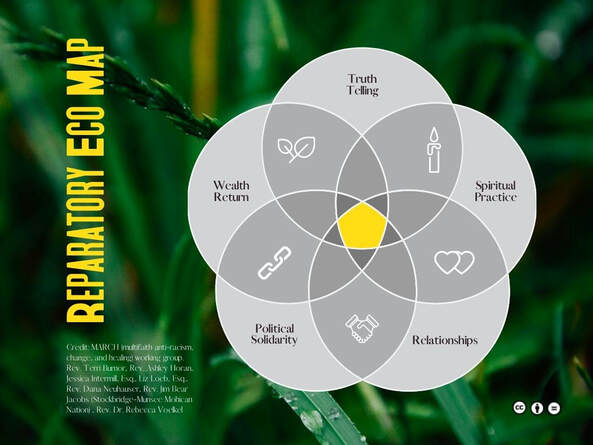|
Rebecca Gonzalez-Campoy, Beloved Community Communications Team Reparations. This word elicits many responses, intellectual, emotional, and spiritual: fear, anticipation, lament, joy, confusion, clarity of purpose, resistance, courage. Reparations means different things to many people. Reparations to the descendants of slavery might be monetary. Reparations to Native American nations would more likely be through returning land, enforcing tribal rights, and honoring treaties. This month, Unity Church delves deeper into conversation about reparations within and among congregants in various spaces, defining what it is and is not, exploring the difference between individual and organizational reparations. I am participating in the Reparations Learning Table, a four-part series about the basics of reparations, offered by Minnesota Interfaith Power and Light. Led by Jessica Intermill and Liz Loeb, we began with this working definition of reparations:
With this definition in mind, Intermill and Loeb explained what reparations is not:
 Perhaps the easiest way to visualize the concept of reparations is to refer to a graphic that Intermill calls the Reparatory Eco Map. Reparations is the intersection of the five sectors — Truth Telling, Spiritual Practice, Political Solidarity, Relationships, and Wealth Return. All are essential, and yet none is sufficient on its own. Each component leads to another with no starting point and no stopping point, meaning that regardless of what portal you enter, the act of reparations is lifelong, generational work. This is about shifting how we live in connection with others and with history. Learning the language of reparations is essential to making this work accessible, allowing anyone to take those first steps. We may enter the Eco Map at different portals. I began at Truth Telling. My white parents could not conceive any more children after me so they turned to adoption. My father had a strong interest in the Ojibwe community and so in 1966 my parents adopted a baby from the White Earth Reservation. In spite of their efforts to connect my brother to his heritage, white society on the North Shore of Lake Superior wasn’t having it, and my brother experienced racism such that he ultimately became estranged from us. In addition, thanks to diligent family history work by one of my sons, I now know that one of my ancestors dealt in land theft from an Indigenous nation in Massachusetts. We may have identifiable personal reasons to get involved with reparations, or we may simply know that we are responsible for the continuation of today’s disparities. Whatever the reason, our work must disrupt systems, not merely apply band-aids and call it good. For those who want to learn more about reparations, be sure to register for the Truth and Healing Indigenous and Climate Justice Series sponsored by Unity’s Indigenous Justice and Act of the Earth Community Outreach Ministry Teams. Session Five will be held Wednesday, March 1, at 7:10 p.m., in Robbins Parlor. The topic is land and reparations and the guest speaker will be Jessica Intermill from Minnesota Interfaith Power & Light. You may also register for the remaining Reparations Learning Table sessions. Previous meetings were recorded and are available to view upon registration. Resources Reparatory Eco Map credit: MARCH (multifaith anti-racism, change, and healing) Rev. Terri Burnor; Rev. Ashley Horan; Jessica Intermill, Esq.; Liz Loeb, Esq.; Rev. Dana Neuhauser; Rev. Jim Bear Jacobs (Stockbridge-Munsee Mohican Nation, Rev. Dr. Rebecca Voekel
0 Comments
Leave a Reply. |
Topics
All
Beloved Community ResourcesUnity Justice Database
Team Dynamics House of Intersectionality Anti-Racism Resources in the Unity Libraries Collection Creative Writers of Color in Unity Libraries The History of Race Relations and Unity Church, 1850-2005 Archives
July 2024
Beloved Community Staff TeamThe Beloved Community Staff Team (BCST) strengthens and coordinates Unity’s antiracism and multicultural work, and provides opportunities for congregants and the church to grow into greater intercultural competency. We help the congregation ground itself in the understanding of antiracism and multiculturalism as a core part of faith formation. We support Unity’s efforts to expand our collective capacity to imagine and build the Beloved Community. Here, we share the stories of this journey — the struggles, the questions, and the collaborations — both at Unity and in the wider world.
The current members of the Beloved Community Staff Team include Rev. Kathleen Rolenz, Rev. KP Hong, Rev. Lara Cowtan, Drew Danielson, Laura Park, Lia Rivamonte and Angela Wilcox. |